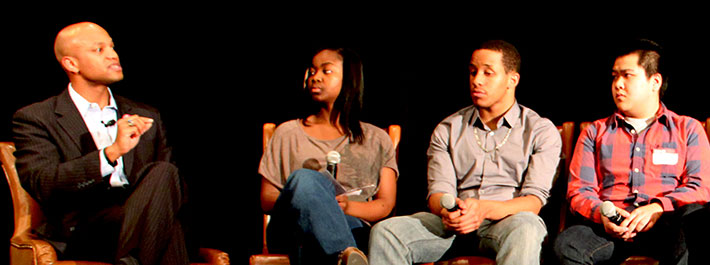CEHD Reads and author Wes Moore
 Each year the First Year Experience Program in the Department of Postsecondary Teaching and Learning partners with CEHD Reads to bring the author of the annual FYE Common Book to campus to talk to first-year students and the College community. This year students were excited to welcome Wes Moore, author of The Other Wes Moore, to campus. Wes Moore is a Rhodes Scholar and a veteran of combat in Afghanistan. He first entered the military after graduating from Valley Forge Military College in 1998 as a commissioned officer. Moore received an undergraduate degree from Johns Hopkins University and went on to get his Masters degree at Oxford University.
Each year the First Year Experience Program in the Department of Postsecondary Teaching and Learning partners with CEHD Reads to bring the author of the annual FYE Common Book to campus to talk to first-year students and the College community. This year students were excited to welcome Wes Moore, author of The Other Wes Moore, to campus. Wes Moore is a Rhodes Scholar and a veteran of combat in Afghanistan. He first entered the military after graduating from Valley Forge Military College in 1998 as a commissioned officer. Moore received an undergraduate degree from Johns Hopkins University and went on to get his Masters degree at Oxford University.
These accomplishments, however, are not at the center of the story he tells in his book, which instead focuses on his childhood growing up in Baltimore and the Bronx. The Other Wes Moore examines the barriers and challenges adolescents growing up in impoverished and violent neighborhoods face. Moore explained that his book uses his own story and the story of another young man also named Wes Moore, who winds up serving a life sentence in prison, as a way of building awareness about all of the “others” who are part of our society. By highlighting the importance of context, as well as the role of mentors, community and service, Moore spoke to many of the issues students have been exploring as they study his book in their First Year Inquiry course. The author used his time with the college community to inspire students to “make a difference.” Moore — a charismatic and engaging speaker — emphasized that “everybody has a shot at something bigger than where they started from”, and that it is our duty to take responsibility for others as well as ourselves if we want to build strong communities.
Students and audience members asked Moore questions about the role of parents, faith, institutions, race and class in determining the different paths of the two Wes Moores. Educators at the event asked Moore how they could better serve their students. He answered, “Consistency is key”. Many adolescents in impoverished neighborhoods and communities face inconsistency on a daily basis, and youth are more likely to reach their potential if they have at least one adult in their life who consistently supports them. While Moore recognized that “potential is universal, opportunity is not”, he encouraged everyone to help make a difference in the lives of adolescents who are faced with fewer opportunities.

